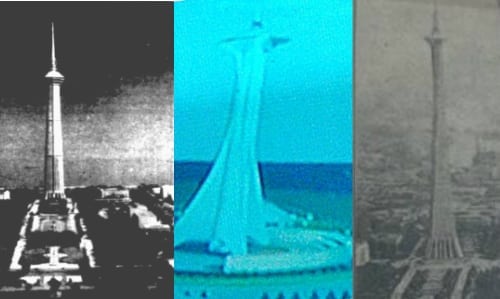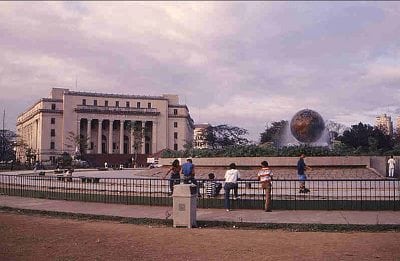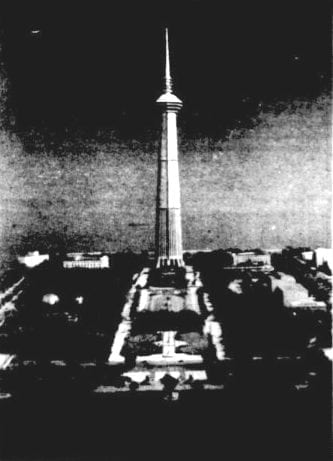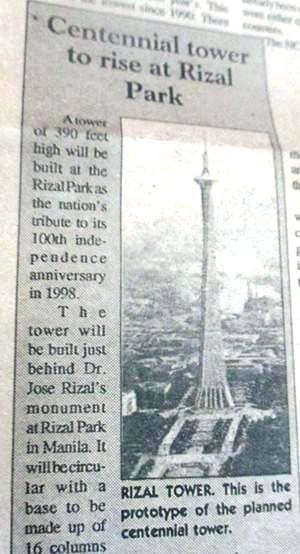The Controversial “Luneta Tower” That Was Never Built

Long before the “national photobomber” ruined the sightline of the Rizal Monument, a “tower of stupidity” almost rose up from the Luneta grounds. Emphasis on almost because as the title suggests, this skyscraper was eventually scrapped and never went past the planning stage.
We are talking about the almost-forgotten Luneta Centennial Tower (or Philippine Centennial Tower), a brainchild of President Ramos that would have rivaled the Eiffel Tower in Paris had it pushed through.
The 100-story Luneta skyscraper, approximately 2.5 times higher than Makati’s Rufino Tower, was supposed to be inaugurated on June 12, 1998–just in time for the first centennial celebration of the country’s independence. Incidentally, that year would also be the end of Ramos’ term as president.
Also Read: 22 Things We No Longer See in Manila
Luneta had been chosen from six other possible sites because “of its historical value, accessibility to the masses and tourists, and aesthetic importance.” According to Francisco “Bobby” Mañosa, the renowned architect who designed the project, the tower would not desecrate the Rizal Monument because “it will stand on the skating rink” in the Agrifina Circle and occupy “only a part of the fourth quadrant” of the park which is not even near the monument.

The tower was designed after the bamboo torch (sulo) to recognize the country’s “Asian heritage and character.” Aside from beautifying the Rizal Park, the said tower was also supposed to house a restaurant, shopping mall, air traffic control facilities, museum, telecommunications center, as well as office space for both government agencies and private companies.
Furthermore, its proponents argued that the cost of building the $200 million-plus tower would be shouldered not by taxpayers but by investors led by the German firm Far East of Walter Bau-AG. The company would manage the tower on a build-operate-transfer (BOT) basis, meaning its ownership would be eventually transferred to the Philippine government after a number of years.
Related Article: 29 Things You’ll Never See in Manila Again
Despite it being envisioned as an iconic landmark that would save Luneta from the brink of decay, the Centennial Tower was met with a flurry of criticisms.
In fact, those who opposed the project called the tower many names: “tower of stupidity,” “tabako tower” (in reference to Ramos), “monument of vanity,” “bay-side monstrosity,” “Ramos Tower,” and a “modern-day tower of Babel.”
Some complained about the tower’s ugly design; newspaper columnist Conrado de Quiros even went as far as calling it “a dirty finger thrust at the faces of the citizens.”

Rep. Milagros Trinidad, on the other hand, warned that “despite the plan for private financing, the debt-burdened government will guarantee the loans and could get stuck with the bill in the long run.”
Even the Imeldific Imelda Marcos herself had a say on the issue: “The people have nothing to eat and yet they are talking of building monuments.”
But no one among the anti-tower critics showed as much zeal as Blas Ople. The late senator believed that such high-rise building would only overshadow and therefore dishonor the man whom the Rizal Park was named after. He, along with Senator Ernesto Maceda, suggested to have the tower built in another location: Quezon City, Fort Bonifacio, or even Ramos’ home province, Pangasinan.
Ople, who tirelessly fought against the commercialization of Luneta, described the tower as a mere “monument to our aspirations for technological greatness, not to Philippine history or culture.”
Also Read: 10 Unforgettable Pinoy Politicians We Wish Were Still Alive
Aside from the tower’s lackluster design, staggering cost, and inappropriate location, political commentator Amando Doronila also pointed out that the ground around Luneta is a “soggy marshland.” For this reason, Doronila feared that the Centennial Tower might only end up as an embarrassing “Leaning Tower of Manila.”
However, a representative of the German firm negated Doronila’s claim, declaring that the company already conducted soil analysis and ensured the safety of the whole project. But even this failed to give a flicker of hope to a project that was already doomed from the start.
In the end, President Ramos and the corruption-plagued DOTC, which in itself was enough to make people suspicious, decided to cancel the project.
Such was the fate of the Luneta Centennial Tower that never saw the light of day.

Nonetheless, the controversies that inevitably crushed the vision of Luneta Tower’s mastermind foreshadowed the hullabaloo that has befallen DMCI’s condominium project. The two buildings both incited public uproar, but the Torre de Manila is different: its construction continued despite its developer’s use of invalid permits.
And that raises the question: If the well-meaning Luneta Tower was shelved to respect Rizal’s memories, why then that the government failed to foresee and prevent an eyesore that is Torre de Manila?
References
Bacobo, A. (1994). Wouldn’t think of trading places with them. Manila Standard, p. 10. Retrieved from https://goo.gl/aTjb1T
Balana, C. (2002). Businesses desecrating Luneta-Ople. Philippine Daily Inquirer, p. A4. Retrieved from https://goo.gl/SN3ctf
Ermita, E. (1996). Centennial Tower to give Luneta a ‘second life’. Manila Standard, p. 5. Retrieved from https://goo.gl/BouvJY
Richburg, K. (1995). Manila’s Monumental Dispute. The Washington Post. Retrieved from http://goo.gl/EvTPoC
Tangbawan, R. (1995). Centennial Tower: Patriotic Monument Or Tower of Vanity?. Associated Press. Retrieved from http://goo.gl/qauPvB
The Seattle Times,. (1995). Philippines Debates Its Own Space Needle. Retrieved from http://goo.gl/7fZcTJ
Villanueva, M. (1995). Shelve tower plans, Ramos asked. Manila Standard, p. 32. Retrieved from https://goo.gl/o5PTnc
FilipiKnow
FilipiKnow strives to ensure each article published on this website is as accurate and reliable as possible. We invite you, our reader, to take part in our mission to provide free, high-quality information for every Juan. If you think this article needs improvement, or if you have suggestions on how we can better achieve our goals, let us know by sending a message to admin at filipiknow dot net
Copyright Notice
All materials contained on this site are protected by the Republic of the Philippines copyright law and may not be reproduced, distributed, transmitted, displayed, published, or broadcast without the prior written permission of filipiknow.net or in the case of third party materials, the owner of that content. You may not alter or remove any trademark, copyright, or other notice from copies of the content. Be warned that we have already reported and helped terminate several websites and YouTube channels for blatantly stealing our content. If you wish to use filipiknow.net content for commercial purposes, such as for content syndication, etc., please contact us at legal(at)filipiknow(dot)net